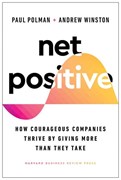- Strategy
Creating Net Positive Business
Paul Polman and Andrew Winston offer a uniquely authoritative guide to doing good business while doing good for the planet and society
While COP26 demonstrated how the climate change debate has moved firmly from ‘why’ to ‘how’—exemplified by an almost universal commitment to ‘net zero’ targets—it also exposed the limitations of governments and reminded us that it will need investment, innovation and radical new thinking from private sector business to save the planet.

Polman and Winston’s book, Net Profit: How Courageous Companies Thrive by Giving More Than They Take, offers a guide to the business models, principles and practices that if followed can deliver for all—a positive message that should urgently be taken up and run with by businesses large and small. But will it be?
Two forces seem to mitigate against it. First, much high-profile ‘green’ lobbying is fundamentally antagonistic towards market capitalism. With its heavy reliance on carbon, spiraling executive pay, busts, bailouts and inequality this may not be surprising (though as Bill Gates pointed out “Anyone who wants to move to North Korea is welcome."). The second negative force comes from business itself, which, due to constant shareholder pressure for short-term profits and inertia when superficially all is well, is too readily wedded to the status quo.
Unlike the green activists, Polman and Winston seek to repair capitalism rather than redesign or ditch it. To counter businesses inertia their manifesto demonstrates how to build strong sustainable profit while doing good—a message that is strengthened with the promise of the enormous new opportunities presented as the world adopts clean energy, eco-viable lifestyles, and moves to more equal societies; not to mention the disastrous consequences of failing to act.
At the macro level the book defines a net positive world where rather than basing global progress on GDP—an industrial age concept—we should “measure what we treasure.” It also looks at many of the large global problems—the misuse of resources, corruption, tax avoidance, unequal pay, deforestation for palm oil, etc.—that a net positive approach can help to solve.
However, the greatest value of this book is in the practical detailed guidance—based on the real experience of Unilever and other early adopters—it offers to would-be net positive companies that seek to strike a new contract between their leadership, their employees, customers, and society at large.
Central to this is their guidance on culture change—starting from these core principles: ownership of all impacts; operating for long-term benefit; positive returns for all stakeholders; shareholder value as a result not a goal; and partnering for systemic change. Leadership is key. Beyond the basics leaders must also have a strong sense of purpose and service, be strong on empathy, courage, and the ability to inspire and build partnerships.
Other culture change goals include: unlocking organizational and employee purpose and passion; thinking big in terms of net positive goals; building trust and transparency; and incorporating a net positive mindset in all activities across all aspects of the business.
The authors seem to sum up their practical call to action in a quote they use from James Baldwin, “Not everything that is faced can be changed. But nothing can be changed until it is faced.”
………………………………………………………………………………………………………………………………
ARTICLES YOU MIGHT LIKE
BOOK REVIEW
A provocative new book reveals the downside of strategic and organizational change and the benefits of stability
DEVELOPING LEADERS QUARTERLY MAGAZINE AND WEEKLY BRIEFING EMAILS

































